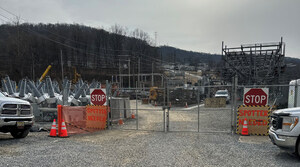FirstEnergy Signs Agreement With Department of Energy for Smart Grid Grants
Projects Planned in Pennsylvania and New Jersey
AKRON, Ohio, June 3 /PRNewswire-FirstCall/ -- FirstEnergy Corp. (NYSE: FE) announced that it has signed an agreement with the Department of Energy (DOE) for grants totaling $57.4 million to introduce "smart grid" technologies to improve the reliability and interactivity of the electric distribution infrastructure in targeted areas of its Pennsylvania, Ohio and New Jersey service territories. The grants were awarded in October of 2009 as part of the American Recovery and Reinvestment Act.
Overall, the company plans to invest a total of $114.9 million on smart grid technologies that will help determine the potential to enhance the operating performance of the local distribution system, and provide incentives to customers to reduce energy use and participate in demand response programs. The DOE grants will be matched by funding already approved for recovery over time by utility commissions in Pennsylvania and New Jersey. As a result, FirstEnergy will begin implementing programs in these states. The Ohio smart grid program is on hold, pending continuing commission review of the program proposal.
"FirstEnergy was one of 100 companies selected by the DOE to receive Smart Grid Investment Grants and we look forward to using new technologies to help our customers save energy and money," said John Paganie, vice president of Customer Service and Energy Efficiency for FirstEnergy. "Our goal is to use these smart grid programs in targeted areas to help lay the groundwork for possible widespread deployment and implementation."
The DOE grants and approved utility commission funding will be used to install smart grid technology in the York, Pa., area served by Metropolitan Edison Company (Met-Ed), and expand the technology already deployed in a number of communities throughout the Jersey Central Power & Light (JCP&L) service area:
- Met-Ed – A voluntary load control program for 23,000 customers in the York area will help reduce peak demand through an integrated system that directly controls air conditioners and other customer appliances during periods of high usage. In addition, deployment of distribution automation and related technologies will help enhance the reliability and efficiency of the system. All of these smart grid improvements will be supported by two-way communications.
- JCP&L – Expanding on smart grid technologies installed earlier this year, the project will use many of the same technologies and features being introduced in Pennsylvania. This voluntary control program involving more than 20,000 customers in New Jersey has the potential to reduce peak load by 30 megawatts.
Smart grid technologies – such as distributed automation, direct load control, smart metering, volt control, advanced protection devices and wireless security – would help improve system reliability and efficiency and enable customers to save money by better managing their energy usage.
FirstEnergy is a diversified energy company headquartered in Akron, Ohio. Its subsidiaries and affiliates are involved in the generation, transmission and distribution of electricity, as well as energy management and other energy-related services. Its seven electric utility operating companies comprise the nation's fifth largest investor-owned electric system, based on 4.5 million customers served within a 36,100-square-mile area of Ohio, Pennsylvania and New Jersey; and its generation subsidiaries control more than 14,000 megawatts of capacity.
Forward-Looking Statements: This news release includes forward-looking statements based on information currently available to management. Such statements are subject to certain risks and uncertainties. These statements include declarations regarding management's intents, beliefs and current expectations. These statements typically contain, but are not limited to, the terms "anticipate," "potential," "expect," "believe," "estimate" and similar words. Forward-looking statements involve estimates, assumptions, known and unknown risks, uncertainties and other factors that may cause actual results, performance or achievements to be materially different from any future results, performance or achievements expressed or implied by such forward-looking statements. Actual results may differ materially due to the speed and nature of increased competition in the electric utility industry and legislative and regulatory changes affecting how generation rates will be determined following the expiration of existing rate plans in Pennsylvania, the impact of the regulatory process on the pending matters in Ohio, Pennsylvania and New Jersey, business and regulatory impacts from American Transmission Systems, Incorporated's realignment into PJM Interconnection, L.L.C., economic or weather conditions affecting future sales and margins, changes in markets for energy services, changing energy and commodity market prices and availability, replacement power costs being higher than anticipated or inadequately hedged, the continued ability of FirstEnergy's regulated utilities to collect transition and other charges or to recover increased transmission costs, operating and maintenance costs being higher than anticipated, other legislative and regulatory changes, revised environmental requirements, including possible greenhouse gas emission regulations, the potential impacts of the U.S. Court of Appeals' July 11, 2008 decision requiring revisions to the Clean Air Interstate Rules and the scope of any laws, rules or regulations that may ultimately take their place, the uncertainty of the timing and amounts of the capital expenditures needed to, among other things, implement the Air Quality Compliance Plan (including that such amounts could be higher than anticipated or that certain generating units may need to be shut down) or levels of emission reductions related to the Consent Decree resolving the New Source Review litigation or other similar potential regulatory initiatives or actions, adverse regulatory or legal decisions and outcomes (including, but not limited to, the revocation of necessary licenses or operating permits and oversight) by the Nuclear Regulatory Commission, factors that may further delay, or increase the costs associated with (including replacement power costs), the restart of the Davis-Besse Nuclear Power Station from its current refueling outage, including that the modifications to control rod drive mechanism nozzles take longer than expected or are not effective, other conditions requiring remediation are discovered during the extended outage, or the NRC takes adverse action in connection with any of the foregoing; Metropolitan Edison Company's and Pennsylvania Electric Company's transmission service charge filings with the Pennsylvania Public Utility Commission, the continuing availability of generating units and their ability to operate at or near full capacity, the ability to comply with applicable state and federal reliability standards, the ability to accomplish or realize anticipated benefits from strategic goals (including employee workforce initiatives), the ability to improve electric commodity margins and to experience growth in the distribution business, the changing market conditions that could affect the value of assets held in FirstEnergy's nuclear decommissioning trusts, pension trusts and other trust funds, and cause it to make additional contributions sooner, or in an amount that is larger than currently anticipated, the ability to access the public securities and other capital and credit markets in accordance with FirstEnergy's financing plan and the cost of such capital, changes in general economic conditions affecting the company, the state of the capital and credit markets affecting the company, interest rates and any actions taken by credit rating agencies that could negatively affect FirstEnergy's access to financing or its costs or increase its requirements to post additional collateral to support outstanding commodity positions, letters of credit and other financial guarantees, the continuing decline of the national and regional economy and its impact on the company's major industrial and commercial customers, issues concerning the soundness of financial institutions and counterparties with which FirstEnergy does business, the expected timing and likelihood of completion of the proposed merger with Allegheny Energy, Inc., including the timing, receipt and terms and conditions of any required governmental and regulatory approvals of the proposed merger that could reduce anticipated benefits or cause the parties to abandon the merger, the diversion of management's time and attention from our ongoing business during this time period, the ability to maintain relationships with customers, employees or suppliers as well as the ability to successfully integrate the businesses and realize cost savings and any other synergies and the risk that the credit ratings of the combined company or its subsidiaries may be different from what the companies expect and the risks and other factors discussed from time to time in its Securities and Exchange Commission filings, and other similar factors. The foregoing review of factors should not be construed as exhaustive. New factors emerge from time to time, and it is not possible for management to predict all such factors, nor assess the impact of any such factor on FirstEnergy's business or the extent to which any factor, or combination of factors, may cause results to differ materially from those contained in any forward-looking statements. FirstEnergy expressly disclaims any current intention to update any forward-looking statements contained herein as a result of new information, future events, or otherwise.
SOURCE FirstEnergy Corp.
WANT YOUR COMPANY'S NEWS FEATURED ON PRNEWSWIRE.COM?
Newsrooms &
Influencers
Digital Media
Outlets
Journalists
Opted In






Share this article